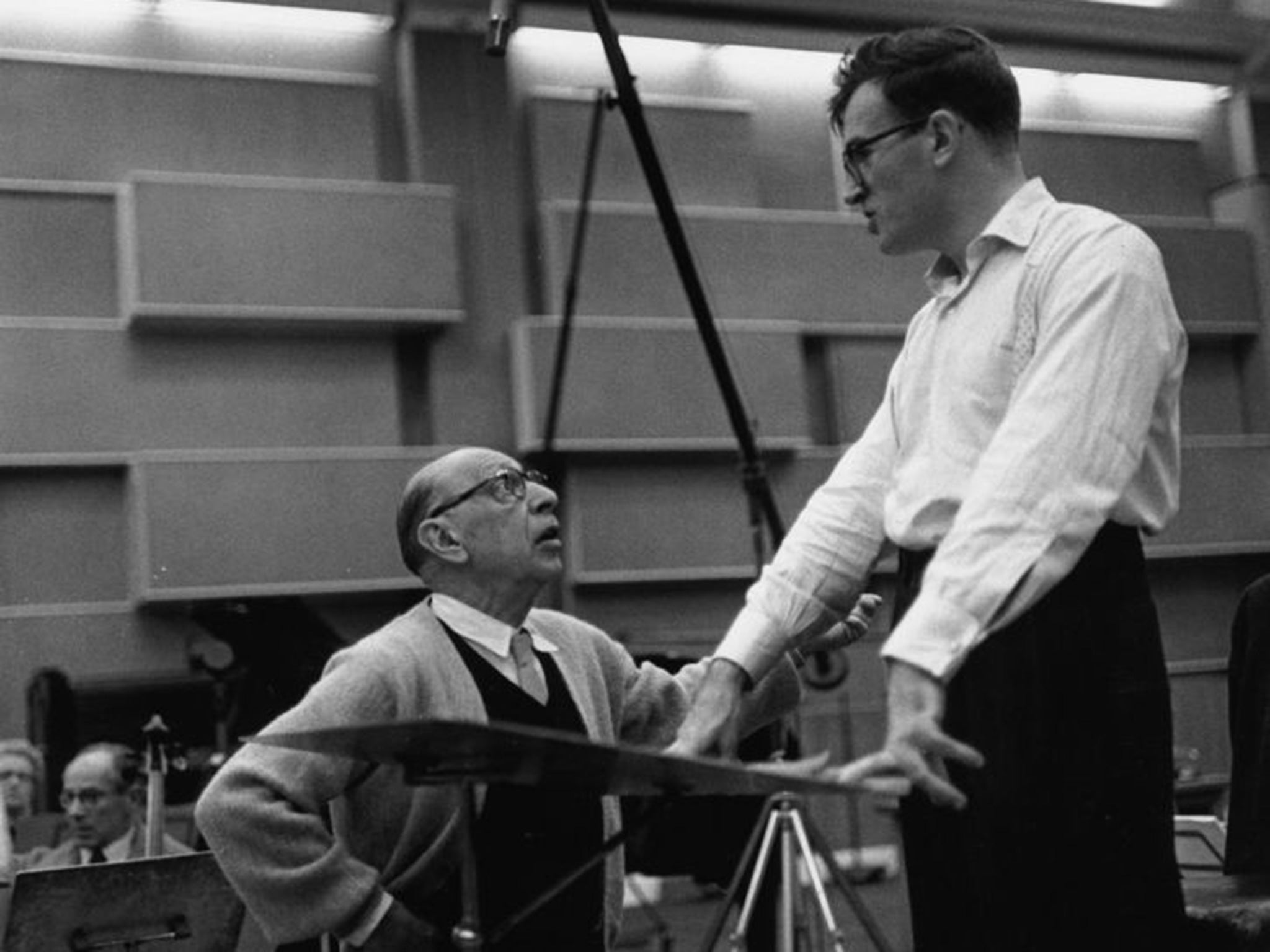Robert Craft: Conductor and music writer whose association with Igor Stravinsky caused discord and controversy
It was not long after their first meeting in 1948 that Craft was invited to move in with the Stravinskys, staying for 23 years

Your support helps us to tell the story
From reproductive rights to climate change to Big Tech, The Independent is on the ground when the story is developing. Whether it's investigating the financials of Elon Musk's pro-Trump PAC or producing our latest documentary, 'The A Word', which shines a light on the American women fighting for reproductive rights, we know how important it is to parse out the facts from the messaging.
At such a critical moment in US history, we need reporters on the ground. Your donation allows us to keep sending journalists to speak to both sides of the story.
The Independent is trusted by Americans across the entire political spectrum. And unlike many other quality news outlets, we choose not to lock Americans out of our reporting and analysis with paywalls. We believe quality journalism should be available to everyone, paid for by those who can afford it.
Your support makes all the difference.Robert Craft was Boswell to Igor Stravinsky’s Johnson – a comparison he vehemently denied, however. But his inseparable association with Stravinsky perhaps deprived him of the full recognition he deserved as a musician and conductor in his own right.
The Stravinsky association was not always to Craft’s advantage either, for he was seen as an opportunist and manipulator – a Svengali figure, even – by those who disliked him. Nevertheless, his many books about Stravinsky provide invaluable records, usually highly entertaining and readable, of the composer’s personal and professional life, from one who had comprehensive access to it for nearly a quarter of a century. It may also be argued that he gave Stravinsky renewed energy at a time of the composer’s waning powers towards the end of the 1940s.
Craft’s first meeting with Stravinsky was extraordinary enough: in 1947 he wrote to the composer asking to borrow a score of Symphonies of Wind Instruments, which he wished to conduct, but otherwise had been unable to find. Perhaps he did not expect Stravinsky even to reply; but he did, with the news that he was working on a new version of the piece and (to his correspondent’s surprise) would conduct it himself at Craft’s concert the following year.
It was not long after their first meeting in 1948 that Craft was invited to move in with the Stravinskys, staying for 23 years. His role was as musical assistant, adviser, amanuensis, companion and perhaps even, as has been suggested, surrogate son.
The books he produced, including Conversations with Igor Stravinsky (1959), Memories and Commentaries (1960) and Retrospectives and Conclusions (1969), took the form of dialogues and were at first generally praised and welcomed. But there was scepticism that a Russian composer with uncertain English and an interviewer with no Russian could produce such eloquent conversations. Craft was also accused of factual errors relating to the composer’s life, notably in 1972 by Stravinsky’s former personal assistant, Lillian Libman.
Craft responded by saying, “[Stravinsky] had opinions, and I took them down. Not the wording, of course. Stravinsky spoke and I put the words together. I don’t say they were his words.” But the accusations still came, and in 2006 the British music critic and Cardiff University academic Stephen Walsh, author of an award-winning, two-volume biography of Stravinsky, condemned Craft’s work as “riddled with bias, error, superstition and falsehood”, words used in retaliation by Craft himself to apply “more aptly” to Walsh’s book, along with claims of plagiarism. In 2013 Craft was still courting controversy by declaring that Stravinsky was bisexual – an assertion received with scepticism if not disbelief by the musical world.
Robert Lawson Craft was born in 1923 in Kingston, New York, and educated at the Juilliard School of Music and the Berkshire Music Center, Tanglewood; he played the trumpet and studied conducting with Pierre Monteux.
His conducting career began in 1950 with the Evenings-on-the-Roof and Monday Evening concerts in Los Angeles, an association that continued until 1968, later conducting the Chicago Symphony, New York Philharmonic and Philadelphia orchestras in the US and London’s Philharmonia Orchestra, London Symphony Orchestra and other ensembles in Britain. He gave the first US performance of the two-act version of Alban Berg’s Lulu at Santa Fe in 1963 and recorded comprehensive Stravinsky, Schoenberg and Webern series (currently on the Naxos label), as well as works in concert ranging from Monteverdi to Pierre Boulez.
Craft is credited with introducing Stravinsky to the music of Schoenberg, resulting in such works as the ballet Agon (1957) and Abraham and Isaac (1964), for baritone and chamber orchestra, both conducted first by Craft. Undoubtedly the course of Stravinsky’s composing took an unexpected turn as a result of this, and Craft did not hesitate to claim the credit for it.
His interests extended far beyond music, and his essays in the New York Review of Books encompassed art, dance, philosophy, television and film, as well as music, and his erudition and deep knowledge were universally recognised, even by those who criticised his involvement with Stravinsky. But as Craft himself explained: “If he [Stravinsky] didn’t want me, he would have thrown me out”.
GARRY HUMPHREYS
Robert Lawson Craft, conductor and writer: born Kingston, New York 20 October 1923; married 1971 Rita Christiansen (marriage dissolved; one son), 1993 Alva Celauro Minoff (one stepdaughter, one stepson); died Gulf Stream, Florida 10 November 2015.
Join our commenting forum
Join thought-provoking conversations, follow other Independent readers and see their replies
Comments